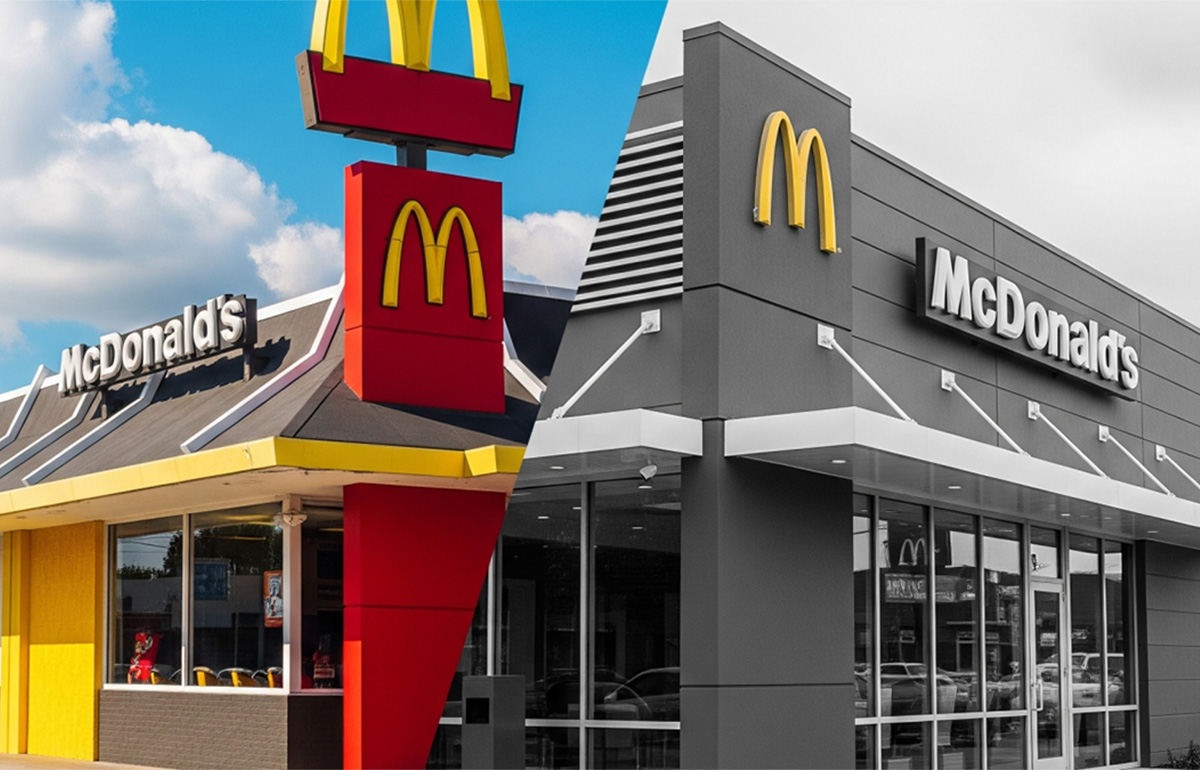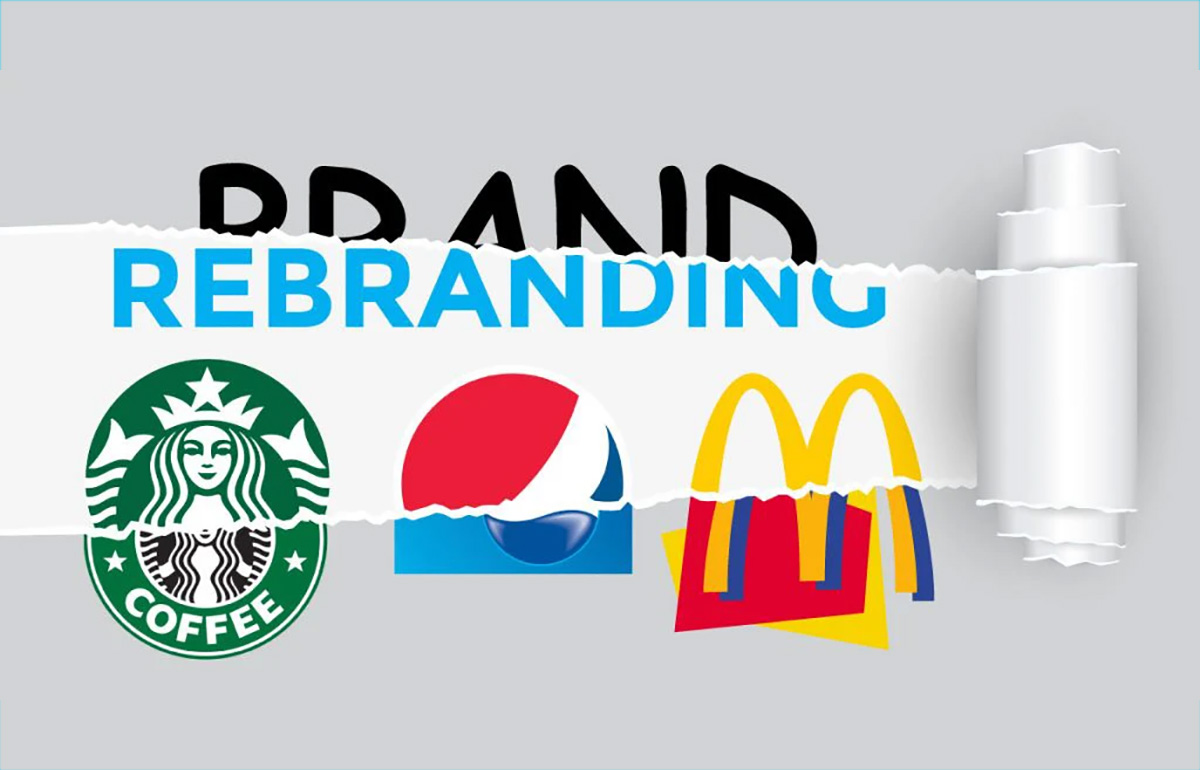REBRANDING
We Help You Build Structure
GENERAL REBRANDING
KEY STEPS & CONSIDERATIONS
The first step in franchising is building a structure. One that works well for not just a single business but for several franchises as well. Franchisors must have professional branding before attempting to franchise their business model or Rebrand their company altogether. Brand Factory Franchising handles the Rebranding concerns that many franchise candidates are faced with.

In essence, a franchise-ready brand is one that is not only successful but also scalable, teachable, and has a clear, attractive identity that can be replicated by others. Rebranding is a strategic process that involves changing a company’s corporate image. It’s more than just a new logo; it encompasses an entire shift in brand identity, messaging, and often, target audience. Successful rebranding requires careful planning and execution.

Understand your current brand perception and identify the reasons for Rebranding. This involves in-depth market research, competitor analysis, and understanding customer needs and preferences.

COMMON PITFALLS TO AVOID
Rebranding without a clear strategic reason:
- Failing to involve key stakeholders, including employees and customers
- Inconsistent application of the new brand identity
- Underestimating the time and resources required for a successful Rebrand

FRANCHISE REBRANDING PROCESS
Rebranding a franchise requires a strategic approach to ensure successful brand transformation across multiple locations while maintaining consistency and respecting local identity.
Below, we outline a 7-step strategy for 2025:
| STEP | DESCRIPTION |
|---|---|
| 1. Define Your Brand Strategy — Involve franchisees from day one through interactive workshops to gather feedback and build excitement. | Before adjusting visual elements, establish a solid foundation by defining your Rebranding objectives, how the new identity strengthens your competitive position, and what brand values you want to communicate. |
| 2. Implement a Phased Approach — Launching your brand (or new brand) across hundreds of locations simultaneously can lead to inconsistencies. To avoid inconsistancies, a 3-phase method is recommended. | Phase 1: Pilot Program (5-10% of franchisees, 2-4 weeks): Test all Rebranding elements with engaged franchisees in strategic markets to gather crucial feedback. Phase 2: Expansion Phase (25-40% of franchisees, 6-8 weeks): Roll out to proven performers whose success stories create momentum. Phase 3: Full Rollout (remaining franchisees, 8-12 weeks): Implement the brand (or new brand) across the complete network with insights and best practices from earlier phases. |
| 3. Provide the Right Tools and Resources — Ensure local teams have a professional toolkit. | Digital asset library: A central location for all logos, templates, brand guidelines, and marketing materials to prevent incorrect usage. Interactive training modules: Creative videos, webinars, and FAQ’s to simplify implementation. Clear timelines and checklists: To keep franchisees on track with clear milestones and regular updates. |
| 4. Leverage Technology — Invest in solutions that optimize processes, strengthen communication, and enable effective teamwork. | Project management software: For organized and aligned stakeholders. Digital asset management (DAM) system: To centralize brand files and ensure consistency. Franchise marketing platform: Combines DAM, customizable templates, and brand compliance into one integrated solution. |
| 5. Communicate Regularly and Transparently — Keep everyone informed, engaged, and enthusiastic. | Provide regular updates: Weekly webinars with Q&A sessions and feedback rounds. Create a central communication hub: A single location for all Rebranding information. Share success stories: To maintain momentum and inspire others. |
| 6. Allow Local Adaptations (with control) — Allow local adaptations while staying true to your brand identity. | A clear brand style guide and dynamic templates are essential. Determine which elements can be locally adapted (e.g., local promotions, contact information, photos, language, events) and which must remain consistent. |
| 7. Monitor and Adjust — Rebranding is an ongoing process. | Monitor customer feedback online, regularly gather feedback from franchisees, and be open to adjustments as time progresses. |
These steps emphasize the importance of strategic planning, franchisee involvement, technological support, and consistent communication for a successful franchise Rebranding.

DEFINE YOUR BRAND STRATEGY
Key Elements of a Franchise-Ready Brand: For a business to be successfully franchised, it needs to possess several key elements that make it attractive to potential franchisees and ensure consistent operation across multiple locations, with:
- Proven Business Model: The business must have a well-tested and profitable model that has been refined over time. This includes a solid customer base and consistent financial performance.
- Strong Brand Identity: A compelling brand story, consistent visual identity (logos, colors, fonts), and a positive online presence are crucial. The brand should resonate with the target audience and stand out from competitors.
- Replicable Operational Systems: Standardized training programs, comprehensive operational manuals, and effective support structures are essential to ensure each franchise unit can deliver the same quality of products or services consistently.
- Demonstrated Financial Performance: Prospective franchisees will scrutinize financial records. The business should show strong profitability and a good return on investment. Transparent financial reporting is vital.
- Streamlined Services and Product Offerings: Identify the most profitable and popular products or services and ensure they can be delivered consistently across all locations. This may involve simplifying offerings for franchising success.
In essence, a franchise-ready brand is one that is not only successful but also scalable, teachable, and has a clear, attractive identity that can be replicated by others.


ARE YOU READY FOR TRANSFORMATION?
Fill out the form below or give us a call to learn more about AI Training. We can initially discuss where your business might best start this journey.
CONNECT WITH US
Connect with us today to take the first definitive step toward your AI-powered future. To discuss your project interests, reach out to us and we’ll schedule something!

DISCOVER OUR FEFI™ GROWTH OPPORTUNITY
Leverage the power of a true growth partnership. Let’s combine your ambition with our AI-powered strategic insights to build your future.
Our in-house ’Franchise Expansion Financing Initiative’ or FEFI™ for short, is an initiative that is specifically engineered and intended for our valued franchise partners and selected business establishments whom are ready to multiply their locations and dominate new markets — either within the US or abroad.
This powerful initiative offers 0.00% interest rate financing for amounts up to $50,000, designed to provide the immediate capital needed to fund the strategic services and assets required to secure your next franchise sale.

RELATED ARTICLES & INSIGHTS
Here’s a look at our ’Strategies For Successful Intenational Expansion — 2025 Report’ which discusses the development of a comprehensive strategy that addresses various aspects of global business, highlighting six (6) key strategies for achieving success in the international franchise development arena.
Visit our Blog to learn more about Franchising, Rebranding, other franchise industry related information, intellectual property (IP) protection, IP enforcement, artificial intelligence (AI) & machine learning (ML), Robotics Process Automation (RPA), or Humanoid Robotics technology integration, AI training, and more.
We continually source the very latest trends, international news headlines, and valuable industry insights surrounding the global franchise markets, notable franchise deals, AI advancements, the latest robotics technologies, advanced encryption solutions, and much, much more.
CLIENT TESTIMONIALS

"We spoke with other ’franchise developers’ and always felt like just another client. With Brand Factory, it was a partnership from day one. They invested in us, not the other way around. Their team became an extension of our own, genuinely committed to seeing our brand’s legacy grow. It’s a completely different, and profoundly better, way of doing business."
— Angela Peterman, Founder, The Gilded Spoon Eatery

"Building the FDD was one thing, but my biggest fear was ’how do we actually sell franchises?’ The moment Brand Factory introduced us to their national sales teams, that fear vanished. These are seasoned professionals who understood our vision and started bringing qualified candidates to the table immediately. We wouldn’t have sold a single unit without them, let alone the 15 we have in development."
— Marcus Thorne, CEO, Urban Grind Coffee Co.

"We thought we knew where to expand, but it was just guesswork based on our hunch. Brand Factory’s AI-informed market analysis was a revelation. It identified untapped markets with the perfect demographic and competitive landscape for our concept. We launched in two of our locations, and the results have far exceeded our projections. They replaced our guesswork with factual certainty."
— Isabella Holmes, Franchise Marketing Director, Mama Lacona’s Italian Restaurant

"I was trapped in my own business, working 80 hours a week just to keep our three locations running. Franchising felt like multiplying that nightmare. Brand Factory showed me how it was actually my path to freedom. By building a system that others could run, I was able to step back from the daily grind and finally become the visionary CEO I always wanted to be. I have my life back."
— Daniel G., Owner, Motorworld Express, LLC.

"We had a beloved local brand, but I never dreamed it could be something more. Brand Factory saw the national potential we couldn’t. Seeing our logo and our concept thriving in cities across the country is an indescribable feeling. They didn’t just help us build a business; they helped us build a legacy that will outlive us all."
— Sophia Dubois, Matriarch, Bayou Kitchen Collective

"From our first conversation to our FDD being filed and our first franchisee being signed felt impossibly fast. Their process is a well-oiled machine. They handle the legal, the strategy, the sales... all the complex parts we had no idea how to navigate. They took a daunting, multi-year process and condensed it into a clear, manageable, and incredibly effective timeline."
— Keith M., President, Patriot Fitness Centers
BOOK YOUR FREE CONSULTATION
HAVE SOME QUESTIONS
A: Our training programs are tailored to your team’s needs and include:
Generative AI Training: Learn how to use tools like ChatGPT, Claude, MidJourney, Adobe Firefly and more for content creation and automation.
Prompt Engineering Workshops: Master the art of crafting prompts that get the right results.
AI Strategy for Campaigns: Training on how to integrate AI into marketing and PR strategies.
Ethical AI Practices: Understand how to use AI responsibly and effectively while avoiding pitfalls like bias and misinformation.
Team Efficiency Training: Learn how AI can automate repetitive tasks and free your team to focus on strategic initiatives.
A: The length of training depends on the scope:
Our basic short workshops: 1-10 days, ideal for prompt engineering or tool-specific training.
Custom training programs: 6-8 weeks, designed for in-depth team transformation.
Long-term engagements: 3-6 months, including initial training, implementation support, and follow-up sessions.
A. Smart tools are only effective in the hands of a skilled user. Our training focuses on teaching your team "how" to leverage these tools strategically. It’s the difference between owning a race car and knowing how to drive it to win. We empower your team to maximize data, increase efficiency, and make informed decisions, turning a software expense into a high-yield investment.
A: We work with a range of AI models, including:
Large Language Models (LLM’s): Like OpenAI’s GPT models.
Vision Models: For image generation and editing.
Speech-to-Text and Text-to-Speech Models: Tools like Whisper and Synthesia.
Custom Models: Built and trained specifically for your business needs.
A: Yes, we train teams on a variety of AI tools, and we are diligent in helping you select the right tech stack for your needs, including, but not limited to:
- ChatGPT
- Claude
- Gemini
- Llama
- Manus
- PaLM
- Mistral
- AI Seek
- Perplexity
- CoPilot
- InVideo
- Canva
- Adobe Express
- Jasper
- MidJourney
- Adobe Firefly
- Synthesia
- HeyGen
- Krock.io
We also train teams on using custom AI models and tools tailored to their workflows.
A. Our training is focused on delivering measurable business outcomes. Clients typically see a significant increase in production performance, a drastic reduction in errors for automated tasks, and quantifiable cuts in overhead costs. For example, by automating tasks that previously took hours of manual work, you directly lower the operational cost per transaction.
A. By training your team to use Robotic Process Automation (RPA), you can automate high-volume, repetitive tasks. This allows you to scale your operations without proportionally increasing your headcount, directly cutting employee overhead. Furthermore, by automating tasks prone to human error, you can reduce workplace incidents and compliance risks, which can lead to lower business insurance premiums.
A. Our training is designed for flexibility. We offer everything from a 1-Day "AI Fundamentals" session for beginners to advanced, multi-day boot camps for technical teams. We customize the curriculum to match the specific roles and existing skill sets within your organization, ensuring the content is always relevant and impactful.
A. Our 1-Day Session (from $795.00) is a high-impact introduction. It covers the core concepts of AI and RPA, helps your team identify tasks within their own jobs that are ripe for automation, and focuses on "quick win" strategies that can be implemented immediately for a fast return on investment.
A. The 5-Day Session (from $2,995.00+) is focused on strategic integration for managers, teaching them how to manage an AI-augmented workforce and measure ROI. The 10-Day Session (from $6,995.00) is a deep, technical dive for teams ready to build their own ’custom AI models’, turning their proprietary data into a unique competitive weapon.
A. Yes. Our 30-Day Intense Training Session (from $17,495.00) is a full transformation partnership where our experts embed with your team. Beyond our structured sessions, we offer customized long-term support retainers to ensure your organization stays on the cutting edge as AI technology continues to evolve.
A. The best way to start is by contacting us for a consultation. We will discuss your specific goals, the current skill level of your team, and your budget to recommend the perfect training path for you, whether it’s a single-day workshop or a long-term transformation partnership.
A. The biggest factor is your people. That’s why our integration process is heavily focused on team training and change management. We ensure your employees understand how and why the new tools are being implemented, empowering them to embrace the technology and become more productive, rather than seeing it as a threat.
A. We cut through the noise. Our experts maintain a constantly updated evaluation of the top AI tools across different categories. Based on the specific needs and budget identified in our discovery phase, we recommend a curated set of proven, reliable, and cost-effective solutions that are the best fit for your unique business goals.
A. Not at all. A core part of our strategy is to integrate AI tools with your existing systems (like your CRM or accounting software). We aim to enhance and automate your current workflows, not force a costly and disruptive replacement of your entire tech stack.
A. RPA is a key component of AI integration. It involves using software "bots" to perform structured, repetitive digital tasks previously done by humans—like data entry, generating reports, processing invoices, or responding to routine customer inquiries. This frees up your skilled employees to focus on high-value strategic work.
A. Our entire methodology is ROI-focused. We use our Brand IQ ™engine to model the potential cost savings and revenue gains before implementation. We prioritize projects with clear, quantifiable benefits, such as reducing employee overhead for specific tasks by 20-40%, increasing lead conversion rates through better targeting, or minimizing waste through predictive inventory management.
A: It’s a comprehensive human enablement program. We go far beyond simple software tutorials. Our training focuses on building foundational AI literacy, developing new skills for a data-driven workplace, and managing the cultural change necessary for successful AI integration.
A. All of the above. We offer customized training tracks for each level. Executives get strategic, high-level briefings on AI’s business impact. Managers learn how to lead teams in an AI-augmented environment. And employees get the hands-on skills they need to use new tools effectively and confidently.
A. It means giving your entire workforce a basic, conceptual understanding of what AI is, what it can do, and what it can’t do. It demystifies the technology, reduces fear, and creates a common language for discussing AI initiatives across the company.
A. It allows us to teach the "why" behind the "what" Because we have a deep, foundational understanding of how the technology actually works — from the code to the cloud infrastructure — we can explain complex topics in a simple, intuitive way that builds true comprehension, not just rote memorization.
A. We never use a generic, one-size-fits-all curriculum. We start by understanding your specific business goals, the AI tools you are implementing, and your company culture. We then tailor the content, examples, and case studies to be directly relevant to your employees’ day-to-day work.
A. The first step is our ’Discovery’ phase, often initiated through a workshop or our 1-Day Training Session. We work with you to analyze your current operations and identify the "low-hanging fruit" — the areas where AI and automation can deliver the most immediate and measurable impact on your efficiency and bottom line.
A. It’s a session designed specifically for leaders and managers. We provide them with a framework and communication tools to address employee concerns, build buy-in, and lead their teams positively through the transition to new AI-powered processes.
A. Yes. We can provide certificates of completion and proficiency for various training modules. This gives employees a tangible recognition of their new skills and can be a powerful motivator.
A. We offer both live, workshops in hotel conference settings or live, in-person workshops setup within our clients’ physical office locations. We come to you. Eventually, we will produce a full library of AI training sessions (educational video content) that will be hosted online and which will deliver a self-paced approach to learning.
A. We use a multi-pronged approach: pre- and post-training assessments to measure knowledge gain, practical exercises to evaluate skill application, and follow-up surveys to gauge employee confidence and the impact on their daily work.
A. It’s a program where we identify and provide advanced training to a select group of enthusiastic employees within your organization. They then become internal advocates and peer mentors, providing frontline support and helping to drive adoption from the ground up.
A. We focus on practical application. For a sales team, we don’t teach them how to code an algorithm. We teach them how to interpret the output of an AI-powered lead scoring tool to prioritize their calls and close more deals. The focus is always on how the tool makes them better at their job.
A. We don’t just train and leave. We can provide ongoing support through "office hours" with our trainers, a dedicated Q&A forum, and a library of quick-reference guides and video tutorials to reinforce the learning.
A. It has taught us how to create training that is incredibly clear, consistent, and scalable. We know how to design a program that can be delivered effectively to 10 people in one office or 1,000 people across 100 different locations, ensuring everyone receives the same high-quality instruction.
A. That is the ultimate goal. Our training is designed to teach employees not just how to use a tool, but how to think critically about data, ask the right questions, and use data-driven insights to make better decisions in their roles every day.
A. Typically, from initial discovery to the launch of the first training module, the process can take 4 to 8 weeks, depending on the complexity and number of custom tracks required.
A. Yes. For large organizations that want to build a self-sustaining training capability, we can deliver a comprehensive "train-the-trainer" program to equip your in-house trainers to deliver our curriculum effectively.
A. We address it head-on, with honesty and empathy. We frame the narrative around "augmentation," NOT "automation." We showcase how AI handles the repetitive, boring tasks, freeing up employees to focus on the more creative, strategic, and fulfilling aspects of their work that require a human touch.
A. It is absolutely critical. When leaders actively participate in the training, champion the initiative, and model the desired data-driven behaviors, it sends a powerful message to the entire organization and dramatically increases the chances of success.
A. Yes. Our team of technical writers and instructional designers can work with your subject matter experts to develop a complete set of professional training materials for your custom-built applications.
A. Our curriculum is modular and constantly updated. As new technologies and best practices emerge, we update our core modules and can provide ongoing "refresher" courses and workshops to keep your team’s skills at the cutting edge.
A. Upskilling is teaching an employee new skills to be better at their current job (e.g., teaching a marketer how to use an AI analytics tool). Reskilling is training an employee for a new role entirely (e.g., training a data entry clerk to become a data analyst who oversees an automated system). We consult on strategies for both.
A. Through interactivity. Our training incorporates hands-on exercises, real-world case studies, group discussions, gamification elements, and practical projects that allow employees to apply what they’ve learned immediately.
A. Absolutely. Integrating AI and data literacy into your standard onboarding process is one of the most effective ways to build a data-driven culture from the ground up.
A. They are skills like critical thinking, creative problem-solving, and collaboration. As AI handles more technical tasks, these human-centric skills become even more valuable. Our leadership and team workshops focus heavily on developing these essential capabilities.
A. We use a baseline assessment to gauge the technical comfort level of the audience and then create different learning paths. We ensure that the foundational concepts are accessible to everyone, while also providing more advanced, optional modules for those who want to go deeper.
A. Yes. A basic "cybersecurity hygiene" module is part of our standard AI literacy training. We teach employees how to use AI tools safely and how to spot potential risks, like phishing attempts that may be generated by AI.
A. For more technical audiences, we can provide specific training on how to use the AI and Machine Learning services within these major cloud platforms, which is essential for any team that will be building or maintaining AI solutions.
A. Yes. We can help you craft the internal communications plan, including live, Brand Factory team presentations, coordinated email announcements, and FAQ documents, to ensure the message is clear, consistent, and positive.
A. For our interactive workshops, we recommend a class size of 12-15 participants to ensure that everyone has a chance to participate and receive individual attention. For lectures or webinars, the audience can be much larger.
A. Yes. We have conducted public speaking engagements, including hosting Conferences, Seminars, Summits, and AI Training Events (in English language) across 22 countries over a span of 4 years. We can work with professional translation services to adapt our materials for different languages and we are experienced in delivering training to culturally diverse, global teams.
A. We focus on building trust and effective delegation. The training teaches the user how to "manage" their AI assistant, how to give it clear instructions, how to review its work, and how to gradually delegate more complex tasks as their confidence in the system grows.
A. That AI is not something to be feared, but a powerful tool that, when used correctly, can make their work more interesting, more strategic, and more valuable.
A. Yes. Our training and consulting can be a key part of establishing a Center of Excellence, which acts as the central hub for AI knowledge, governance, and best practices within your organization.
A. We teach them a framework for "thinking in AI." We train them to look at business problems and ask, "Is this a prediction problem? An automation problem? An anomaly detection problem?" This allows them to proactively identify use cases for AI in their day-to-day work.
A. This is a critical module in our leadership track. We facilitate discussions on fairness, accountability, and transparency, helping leaders create a governance framework for the ethical deployment of AI.
A. No. Our team plans to eventually develop an e-learning library with rich and professional video tutorials, expert interviews, and animated presentations to make the content more engaging and accessible. But, at this time, we do not have have any such video tutorial materials.
A. The cost varies widely based on the level of customization, the number of employees, and the delivery format. We work with you to design a program that fits your budget and delivers a clear return on investment.
A. This is a critical module in our leadership track. We facilitate discussions on fairness, accountability, and transparency, helping leaders create a governance framework for the ethical deployment of AI.
A. Yes, our e-learning library is rich with professionally produced video tutorials, expert interviews, and animated explainers to make the content more engaging and accessible.
A. The cost varies widely based on the level of customization, the number of employees, and the delivery format. We work with you to design a program that fits your budget and delivers a clear return on investment through increased productivity and improved performance.
A. We approach this from a defensive and ethical perspective. The training is for marketing and leadership teams to understand how these techniques are used in the market to shape public opinion or customer behavior, so they can both recognize them and use similar ethical, persuasive technologies to ensure their own brand message is clear and effective.
A. It starts with a simple, no-cost needs analysis call. We’ll discuss your goals, the tools you’re considering, and the current skill level of your team. From there, we can provide a high-level proposal outlining a potential training plan.
A. We understand that resistance to change is really just a fear of the unknown. That’s why our first module is always focused on "demystifying" AI. We show them, in very practical terms, how these tools will make their specific jobs easier, not harder. When they see it’s about helping them, not replacing them, we find that resistance quickly turns into curiosity.
A. That’s a common reality, and we get it. We help you justify the cost by framing it as risk mitigation. The cost of a failed AI implementation due to poor user adoption is far greater than the cost of training. We position training not as a "nice-to-have," but as an essential insurance policy to guarantee the ROI on your much larger technology investment.
A. That’s a fair point. While YouTube is great for learning isolated skills, it can’t provide a customized, strategic learning journey for your company. We build a program that is tailored to your specific tools, your data, your culture, and your business goals. It’s the difference between watching random cooking videos and attending a culinary school designed to make you a professional chef.
A. We have no doubt your team is incredibly smart. But even the smartest people can’t know what they don’t know. Without formal training, they may only ever use 10% of a tool’s capability. Our training accelerates their learning curve dramatically and ensures they are using the new systems to their full potential, which is where the real value is unlocked.
A. We understand that every minute of an employee’s time is valuable. That’s why we specialize in "micro-learning" and blended formats. We can design a program with short, 15-30 minute e-learning modules, combined with optional, focused workshops. We fit the training into the flow of work, rather than pulling people out of it for long, unproductive periods.
A. That’s an important distinction. We are technologists and strategists who have become expert trainers. Our 30+ years of deep tech experience means we don’t just teach the "how"; we explain the "why" in a way that professional trainers without that background simply can’t. Our clients find that this deep, practical knowledge makes the training far more credible and effective.
A. That is actually the perfect time to start. We can begin with our foundational ’AI Literacy’ program. It gives your team a solid, vendor-agnostic understanding of the concepts. This not only prepares them for what's coming but also empowers them to be part of the tool selection process, which dramatically increases future buy-in.
A. We are sorry to hear that, and it’s often because the training wasn’t relevant or engaging. Our approach is different. We make it highly interactive and use your company’s own data and real-world problems in the exercises. When employees see that the training is directly helping them solve the problems they face every day, their engagement level changes completely.
A. We agree completely. A standardized program wouldn’t work. That's why we don’t offer one. Our entire process is built around customization. We spend time with you and your team to understand your culture, your language, and your values, and we weave that understanding into every module we create for you.
A. That’s a classic leadership concern. The only thing worse than training your employees and having them leave is not training them and having them stay. Investing in your team’s skills fosters loyalty and shows them you are committed to their growth. It makes your company a more attractive place to work, which actually improves retention in the long run.
A. That’s a valid point. While specific software interfaces might change, the fundamental concepts we teach—how to think about data, how to frame a business problem for AI, how to interpret results—are timeless. We focus on building that core, adaptable skillset, and then we provide ongoing "micro-update" modules to keep your team current on the specific tools.
A. We understand the executive dynamic perfectly. That’s why our leadership training is framed as a "strategic executive briefing" or a "masterclass," not a remedial class. It’s positioned as a high-level, confidential forum for peers to discuss the strategic implications of AI, which allows them to learn and ask questions in a safe and appropriate environment.
A. We are built for this. Our blended learning model is ideal for global teams. Soon, we will be developing a core library of self-paced, e-learning modules that can be accessed anytime, anywhere from our server. We are currently developing our own virtual platform solution to support our plans on supplementing our (in-person) AI training sessions with live, virtual workshops (to be scheduled at times that are convenient for different regions). Certainly, we fully intend to work with our clients to ensure that all of such content is culturally sensitive.
A. No, not at all. However, we do understand that common perception. Keep in mind, AI training can have an even bigger impact on a small business. Because your team members wear multiple hats, upskilling them can create massive efficiency gains. We can design a lean, highly-focused AI training program that is affordable and delivers an outsized return for a smaller, more agile team.
A. No worries. That is our primary concern to avoid. Our specialty is making the complex simple. We use analogies, real-world examples, and hands-on exercises. We have a rule: if a non-technical employee can’t understand a concept after we’ve explained it, then we haven’t done our job correctly.
A. It can seem that way, but it is measurable. We work with you to establish baseline metrics before the training begins. This could be user adoption rates for a new software, the time it takes to complete a certain task, or even employee satisfaction scores. We then measure those same metrics after the training to demonstrate a clear, quantifiable impact.
A. We have great respect for internal L&D teams and often partner with them. They are experts in adult learning theory and your company culture. We bring the deep, specialized subject matter expertise in AI and its application that is typically outside their scope. By combining our expertise, we can create a program that is better than either of us could build alone.
A. We are very experienced with this. We make a conscious effort to speak clearly, avoid jargon and idioms, and use a lot of visual aids. We can also provide transcripts of our video content and, if needed, work with professional services to provide translated subtitles or materials.
A. That’s a great question. While you can’t "innovation," you can create the conditions for it to flourish. By giving your employees a new set of powerful AI tools and the confidence to use them, you empower them to experiment and find new, better ways of solving problems. You are giving them a bigger sandbox to play in, which is the foundation of innovation.
A. You are not alone in feeling that way, and it’s the most common starting point. That’s why our process begins with a no-cost needs analysis. We’ll have a simple conversation about your business goals, and we can help you map those goals to a clear, simple training plan. Our job is to take the confusion and turn it into a clear path forward.

Let’s Create An Exciting Franchise Arrangement For Your Business
Our aim is to ensure that everything is seamless for our clients so they may grow their enterprise operations without having to deal with the sales and marketing aspects.

Copyright © 2025 Brand Factory Franchising, Inc.
All Rights Reserved. | Powered with Pizzazz
